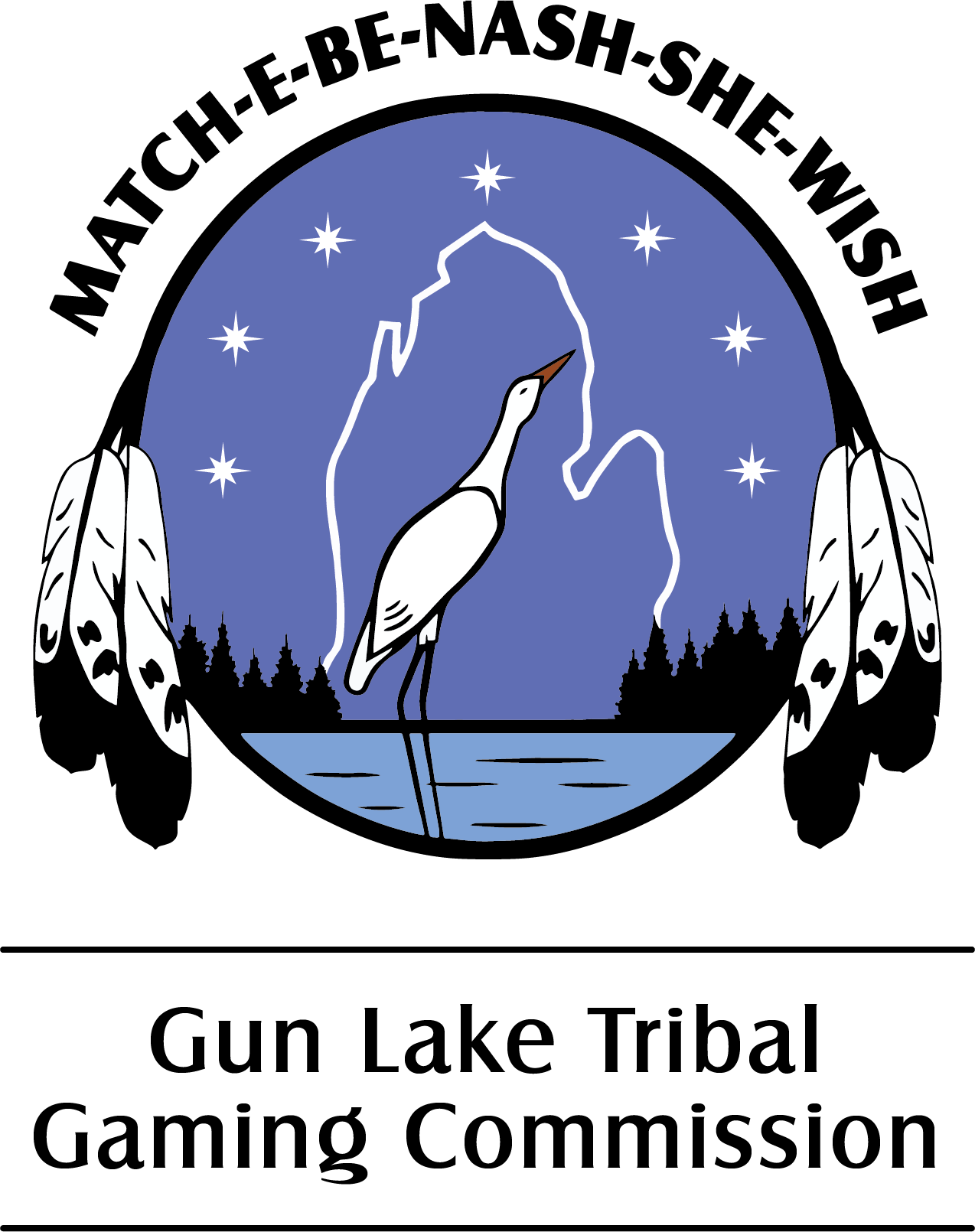Regulations
The Gun Lake Tribal Gaming Commission was created through resolution of the Match-E-Be-Nash-She-Wish Band of Patowattomi Indians Tribal Council on July 17th, 2003 and approved by the National Indian Gaming Commission on August 6th, 2003.
The current gaming ordinance was approved by the National Indian Gaming Commission on October 18th, 2024.
The compact between the Match-E-Be-Nash-She-Wish band of Pottawatomi and the State of Michigan was entered into on May 9th, 2007.
The National Indian Gaming Commission current Minimum Internal Control Standards (MICS) were issued on June 27, 2002 and amended on August 12, 2005.
The current Tribal Internal Control Standards (TICS) as approved by Tribal Council March 6, 2020.
The current Rules and Regulations propagated by the Gun Lake Tribal Gaming Commission and approved by Tribal Council on August 13, 2020.
Indian Nations are the front-line regulators of Indian gaming. They have placed the highest priority on the security of the industry.
No one has a greater interest in protecting the integrity of Indian gaming than the Tribes themselves. It is the most precious economic resource they’ve ever had. Tribes have agreed to allow the federal government to play a role in overseeing Indian gaming, but they will never rely on the federal government to be the primary protector against crime.
Indian gaming is already subject to more stringent regulation and security controls than any other type of gaming in the United States.
Tribal gaming operations are regulated at four distinct levels – Tribal government, state government, the National Indian Gaming Commission and federal government agencies such as the U.S. Justice Department, the FBI, the IRS and the Bureau of Indian Affairs.
Indian Nations, such as the Gun Lake Tribe, have established their own gaming commissions and have developed Tribal police forces and Court Systems to combat crime. Many Tribes have invested heavily in high-tech surveillance equipment. Because Indian Gaming (Class III) is a new emerging industry, only new “state of the art” electronic equipment and machines are in use. Indian Nations have established Industry Standards and Internal Controls. Tribes have more personnel by far regulating Tribal casinos than regulate Nevada casinos.
Compacts between states and Tribes give states some regulatory power over Indian gaming, though IGRA recognizes that the federal government has primary responsibility for government-to-government relations with sovereign Indian nations.
IGRA (Indian Gaming Regulatory Act) Establishes Framework for Regulation
IGRA created three classes of gaming:
Class I – social games solely for prizes of minimal value or traditional forms of Indian gaming as a part of Tribal ceremonies or celebrations;
Class II – bingo and related games, including pull-tabs, lotto, punch boards, tip jars, instant bingo and some card games, excluding house banking card games such as blackjack and baccarat;
Class III – all forms of gaming that are not Class I or Class II, including slot machines and blackjack.
The National Indian Gaming Commission has extensive regulatory requirements for Tribal gaming operations and must give final approval to all Indian casino management contracts.
Class I gaming is regulated solely by Tribes. Class II gaming is regulated solely by Tribes if they meet conditions set forth in IGRA. Regulation of Class III gaming is governed by Tribal-state compact.
Gaming holds some hope for reducing Indian poverty, but it is not a panacea. Less than 1/3 of all Indian Nations have gaming operations. More states have lotteries (37) than have Indian gaming (21). Second, even where Tribes have built thriving gaming businesses, these limited and perhaps temporary successes cannot quickly reverse centuries of failed economics.
A flow chart of the regulatory structure looks like this:
Tribal Government
Establish Tribal Gaming Commission
Provide front-line regulation of Tribal gaming, including security and surveillance measures
Manage Tribal gaming operations
Adopt ordinances and issue licenses for gaming operations and employees including background checks
Negotiate compacts with state for Class III gaming
Provide protection and law enforcement
Establish Tribal Court
Department of Interior
Rules on land into trust issues
Rules on plans for allocation of Tribal gaming revenues
Conducts investigative studies
Approves Tribal-state compacts
National Indian Gaming Commission
Approves management contracts
Regulates gaming
Conducts background checks & reviews terms of contracts
Authority to enforce civil penalties & impose fines up to $25,000 per day and to order establishment closed
Department of Justice
Enforces criminal violation of gaming laws
Conducts background checks of key gaming employees
Conducts investigative studies
State Government
Negotiates compacts with tribes for Class III gaming
Enforces provisions of Tribal-state compact

